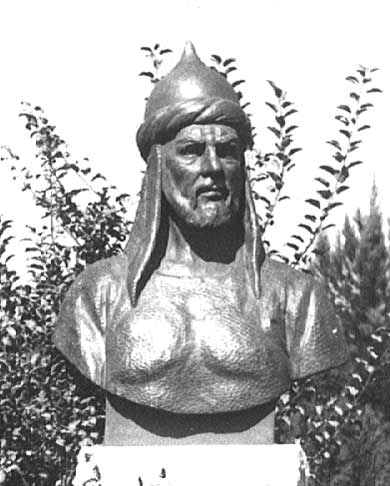- Abu Muslim Khorasani
Infobox Person
name = Abu Muslim Khorasani

image_size =
caption = A sculpture of Abu Muslim Khorasani
birth_name =
birth_date =
birth_place =Balkh , Khorasan (today inAfghanistan )
death_date =
death_place =Iraq
death_cause =
resting_place=
resting_place_coordinates =
residence =
nationality =
other_names = Behzādān pour Vandād Hormozd [ Two Centuries of Silence,Abdolhossein Zarinkoob ] ( _fa. بهزادان پور ونداد هرمزد)
known_for =
education =
employer =
occupation =
title =
salary =
networth =
height =
weight =
term =
predecessor =
successor =
party =
boards =
religion =
spouse =
partner =
children =
parents =
relatives =
website =
footnotes =Abu Muslim Abd al-Rahman ibn Muslim al-Khorasani (PerB|ابو مسلم خراسانى, ArB|أبو مسلم عبد الرحمن بن مسلم الخراساني, c. 700 - 755) was an
Abbasid general of Persian ("Tājīk") origin, born in city ofBalkh in Khorasan (modern-dayAfghanistan ) who led the first liberal movement against theUmayyad dynasty .Although there is debate on what his real name was, Behzadan was bestowed unto him by the Abbasids. He grew up in
Kufa , inIraq .Abu Muslim was a major supporter of the Abbasid cause, having met with their
Imam Ibrahim ibn Muhammad inMecca , and was later a personal friend of Abu al-'AbbasAl-Saffah , the future Caliph. He observed the revolt inKufa in 736 tacitly. With the death of theUmayyad Caliph Hisham ibn Abd al-Malik in 743, the Islamic world was launched into civil war. Abu Muslim was sent to Khorasan by the Abbasids initially as a propagandist and then to revolt on their behalf. He tookMerv in December 747 (or January 748), defeating theUmayyad governor thereNasr ibn Sayyar , as well as Shayban al-Khariji, aKharijite aspirant to the caliphate. He became thede facto Abbasid governor of Khorasan, and gained fame as a general in the late 740s in defeating the peasant rebellion ofBihafarid , the leader of a syncretic Persian sect that wereMazdaism . Abu Muslim received support in suppressing the rebellion both from purist Muslims and Zoroastrians. In 750, Abu Muslim became leader of the Abbasid army and defeated the Umayyads atBattle of the Zab . Abu Muslim stormedDamascus , the capital of the Umayyad caliphate, later that year.His heroic role in the revolution and military skill, along with his conciliatory politics toward
Shia ,Sunnis ,Zoroastrians ,Jew s, andChristian s made him extremely popular among the people. Although it appears that Abu al-'Abbas trusted him in general, he was wary of his power, limiting his entourage to 500 men upon his arrival toIraq on his way toHajj in 754. Abu al-'Abbas's brother,al-Mansur (r. 754-775), advised al-Saffah on more than one occasion to have Abu Muslim killed, fearing his rising influence and popularity. It seems that this dislike was mutual, with Abu Muslim aspiring to more power and looking down in disdain on al-Mansur, feeling al-Mansur owed Abu Muslim for his position. When the new caliph's uncle, Abdullah ibn Ali rebelled, Abu Muslim was requested by al-Mansur to crush this rebellion, which he did, and Abdullah was given to his nephew as a prisoner. Abdullah was ultimately executed.Relations deteriorated quickly when al-Mansur sent an agent to inventory the spoils of war, and then appointed Abu Muslim governor of
Syria andEgypt , outside his powerbase. After an increasingly acrimonious correspondence between Abu Muslim and al-Mansur, Abu Muslim feared he was going to be killed if he appeared in the presence of the Caliph. He later changed his mind and decided to appear in his presence due to a combination of perceived disobedience, al-Mansur's promise to keep him as governor of Khorasan, and the assurances of some of his close aides, some of whom were bribed by al-Mansur. He went toIraq to meet with al-Mansur's inMadain in 755. al-Mansur proceeded to enumerate his grievances against Abu Muslim, who kept reminding the Caliph of his efforts to enthrone him. al-Mansur then signaled five of his guards behind a portico to kill him. Abu Muslim's mutilated body was thrown in the riverTigris , and his commanders were bribed to acquiesce to the murder.His murder was not well-received by the Persians, particularly not by the residents of
Khorasan , and there was resentment among the population over the brutal methods used by al-Mansur. He became a legendary figure for many in Persia, and several Persian heretics started revolts claiming he had not died and would return; the latter included his own propagandist,Ishaq al-Turk , theZoroastrian cleric,Sunpadh , inNishapur , andal-Muqanna in Khorasan. EvenBabak claimed descent from him.Books
At least two epic romances were written about him:
*Citation
last =Marzubānī
first =Muḥammad ibn ʻImrān
author-link =
last2 =
first2 =
author2-link =
year =
date =
publication-date =
contribution =
contribution-url =
editor-last =
editor-first =
editor-link =
editor2-last =
editor2-first =
editor2-link =
title =Akhbār shuʻarāʾ al-Shīʻah
edition =
series =
place =
publication-place =
publisher =
volume =
pages =
id =
isbn =
doi =
oclc =
url =
*Citation
last =Muḥammad ibn Ḥasan
first =Abū Ṭāhir Ṭarsūsī
author-link =
last2 =
first2 =
author2-link =
year =
date =
publication-date =
contribution =
contribution-url =
editor-last =
editor-first =
editor-link =
editor2-last =
editor2-first =
editor2-link =
title = Abū Muslimʹnāmah
edition =
series =
place =
publication-place =
publisher =
volume =
pages =
id =
isbn =
doi =
oclc =
url =Trivia
*Abu Muslim of Khorasan is considered the "father of the Tajik nation".
*Abu Muslem FC, an Iranian football club is named after him.ee also
*
Babak Khorramdin
*Sunpadh or Sinbad the Magus
*Behafarid External links
* [http://members.tripod.com/~khorasan/TajikPersonalities/AbuMulimKhorasani.htm A short biography on a Tripod site about Khorasan]
* [http://history.al-islam.com/display.asp?f=bdy02219.htm Ibn Kathir biography of Abu Muslim "(in Arabic)"]References
Wikimedia Foundation. 2010.
